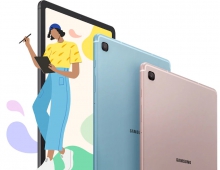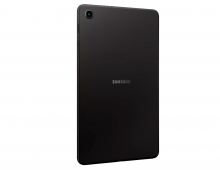
Ubuntu Comes To Tablets
Canonical today presented Ubuntu's tablet interface - the next step towards the company's vision to offer a unified family of experiences for personal computing on phones, tablets, PCs and TVs.
The ne winterface will compete with Android, iOS and Windows with its own take on multitasking and advanced security features.
"Multi-tasking productivity meets elegance and rigorous security in our tablet experience," said Mark Shuttleworth, founder of Ubuntu and Canonical. "Our family of interfaces now scales across all screens, so your phone can provide tablet, PC and TV experiences when you dock it. That's unique to Ubuntu and it's the future of personal computing."
Ubuntu for tablets allows a phone app on the screen at the same time as a tablet app. The Ubuntu side stage was invented both to enable multitasking and to improve the usability of phone apps on tablets.
The platform supports the creation of multiple accounts on one tablet with full encryption for personal data, combined with the trusted Ubuntu security model.
The Heads-Up Display, unique to Ubuntu, makes it easy to do complex things on touch devices, and transforms touch interfaces for rich applications, bringing all the power of the PC to your tablet.
Screen edges are used for navigation between apps, settings and controls.
Media is neatly presented on the customisable home screen, which can search hundreds of sources.
The tablet interface is presented by exactly the same OS and code that provides the phone, PC and TV interfaces, enabling true device convergence.
The Ubuntu tablet interface supports screen sizes from 6" to 20" and resolutions from 100 to 450 PPI. "The tablet fits perfectly between phone and PC in the Ubuntu family" says Oren Horev, lead designer for the Ubuntu tablet experience. "Not only do we integrate phone apps in a distinctive way, we shift from tablet to PC very smoothly in convergence devices."
On high end silicon, Ubuntu offers a PC experience when the tablet is docked to a keyboard, with access to remote Windows applications over standard protocols from Microsoft, Citrix, VMWare and Wyse.

Even without chipset-specific optimisation, Canonical claims that Ubuntu performs beautifully on entry level hardware. "Our four-year engagement with ARM has shaped Ubuntu for mobile" said Rick Spencer, VP Ubuntu Engineering at Canonical. "We benefit from the huge number of contributing developers who run Ubuntu every day, many of whom are moving to touch devices as their primary development environment."
For silicon vendors, Ubuntu is compatible with any Linux-oriented Board Support Package (BSP). This means Ubuntu is easy to enable on most chipset designs that are currently running Android. Ubuntu and Android are the two platforms enabled by Linaro members.
The Touch Developer Preview of Ubuntu will be published on the 21st February 2013 with installation instructions for the Nexus 7 and Nexus 10 tablet devices as well as smartphones such as the Nexus 4 and Galaxy Nexus.
The Preview SDK, which currently supports phone app development, will now be updated to support tablet apps as well. Uniquely, on Ubuntu, developers can create a single application that works on the phone, tablet, PC and TV because it is the same system and all services work across all form factors.
The Canonical team will be available to install Ubuntu on your phones and tablets at Mobile World Congress.
"Multi-tasking productivity meets elegance and rigorous security in our tablet experience," said Mark Shuttleworth, founder of Ubuntu and Canonical. "Our family of interfaces now scales across all screens, so your phone can provide tablet, PC and TV experiences when you dock it. That's unique to Ubuntu and it's the future of personal computing."
Ubuntu for tablets allows a phone app on the screen at the same time as a tablet app. The Ubuntu side stage was invented both to enable multitasking and to improve the usability of phone apps on tablets.
The platform supports the creation of multiple accounts on one tablet with full encryption for personal data, combined with the trusted Ubuntu security model.
The Heads-Up Display, unique to Ubuntu, makes it easy to do complex things on touch devices, and transforms touch interfaces for rich applications, bringing all the power of the PC to your tablet.
Screen edges are used for navigation between apps, settings and controls.
Media is neatly presented on the customisable home screen, which can search hundreds of sources.
The tablet interface is presented by exactly the same OS and code that provides the phone, PC and TV interfaces, enabling true device convergence.
The Ubuntu tablet interface supports screen sizes from 6" to 20" and resolutions from 100 to 450 PPI. "The tablet fits perfectly between phone and PC in the Ubuntu family" says Oren Horev, lead designer for the Ubuntu tablet experience. "Not only do we integrate phone apps in a distinctive way, we shift from tablet to PC very smoothly in convergence devices."
On high end silicon, Ubuntu offers a PC experience when the tablet is docked to a keyboard, with access to remote Windows applications over standard protocols from Microsoft, Citrix, VMWare and Wyse.

Even without chipset-specific optimisation, Canonical claims that Ubuntu performs beautifully on entry level hardware. "Our four-year engagement with ARM has shaped Ubuntu for mobile" said Rick Spencer, VP Ubuntu Engineering at Canonical. "We benefit from the huge number of contributing developers who run Ubuntu every day, many of whom are moving to touch devices as their primary development environment."
For silicon vendors, Ubuntu is compatible with any Linux-oriented Board Support Package (BSP). This means Ubuntu is easy to enable on most chipset designs that are currently running Android. Ubuntu and Android are the two platforms enabled by Linaro members.
The Touch Developer Preview of Ubuntu will be published on the 21st February 2013 with installation instructions for the Nexus 7 and Nexus 10 tablet devices as well as smartphones such as the Nexus 4 and Galaxy Nexus.
The Preview SDK, which currently supports phone app development, will now be updated to support tablet apps as well. Uniquely, on Ubuntu, developers can create a single application that works on the phone, tablet, PC and TV because it is the same system and all services work across all form factors.
The Canonical team will be available to install Ubuntu on your phones and tablets at Mobile World Congress.





















